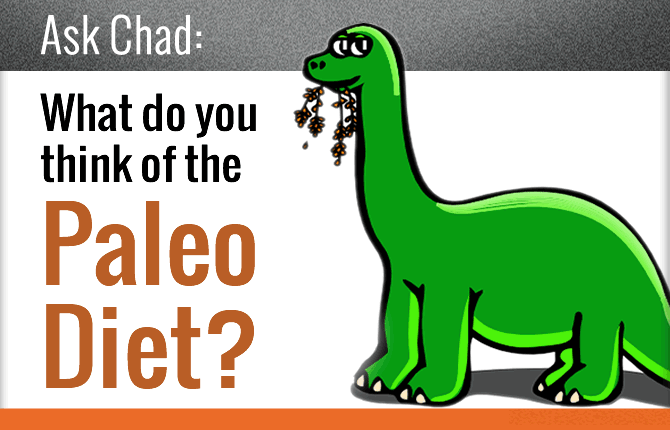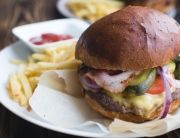If you follow any health- or food-related blogs — or if you spend any time on Pinterest — you’ve probably seen the term “Paleo diet” a lot more over the past few months. (Sometimes also called the “Caveman Diet.”) If you’ve asked your personal trainer and still need an explanation, Wikipedia offers this summary:
The Paleolithic diet… is a modern diet designed to emulate… the diet made up of wild plants and animals eaten by humans during the Paleolithic era. Proponents of the diet recommend avoiding any foods that they claim were not available to humans at that time, including dairy products, grains, legumes, processed oils, and refined sugar…. Proponents claim that modern humans’ inability to properly metabolize these comparatively new types of food has led to modern-day problems such as obesity, heart disease, and diabetes.
(Wikipedia goes on to explain some arguments against the diet, as well.)
Whether or not you buy into the reasoning on which it’s based, or the severe limits it imposes, there are helpful elements. In fact, many diets that differ in the particulars — Paleo diet, “clean eating,” GAPS diet, South Beach diet, the Mediterranean diet, and many others — all point to clear benefits from ridding our diets of white carbs and other factory-made food.
Whether you believe that our bodies and the food found in nature were created by God (which I do), or you believe they purposefully evolved by some other force, it seems a solid premise that our bodies will function best on food that is closest to what’s found in nature; not broken down and reassembled with man-made chemicals. We’re just beginning to understand all the components of food and how they work together to affect our health. One example being how fat, fiber and enzymes help us absorb vitamins.
People on a low-fat diet often find their hair drying out and/or falling out. We now know this is because vitamins A, D, E and K are fat soluble vitamins, so a low-fat diet can rob the body of these important elements that contribute to over-all health — including the health of our hair!
As a personal trainer, what’s my take on the Paleo Diet?
So do I recommend the Paleo diet? I have trouble recommending anything if I can’t show you a measurable improvement in health. I think that the Paleo approach goes too far in some areas. If you don’t include enough low-starch vegetables, it can easily result in too little fiber intake. For me, a healthy diet boils down to eating real foods the way they were put on the planet.
As always, if you have more questions, ask me, your trusted, expert personal trainer in Wichita!




